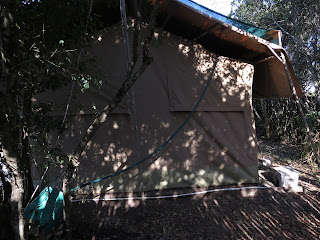 |
| The Shower Stall |
 |
| Click to make larger They fill the bucket with hot water Then raise it so the water flows through the hose |
 |
| Another view of the shower setup |
On our afternoon drive duma took us by the ranch
area of the Conservancy where they raise cattle. The ranch helps support the
Conservancy and the cattle complement the wild animals that also graze on the
land. These are brahma-like cattle with massive horns. They are controlled with
an electric fence. Elephants are kept out with a unique set of electric wires
at chest level. About two feet long they poke the elephants as they approach
the fence which otherwise would offer no resistance to the huge elephants.
Because the chest of the elephant is sensitive, these seemingly innocuous wires
keep the elephants in their place.
 |
| Nubian Woodpecker outside our tent |
We made one interesting stop so Duma could show
us some black rhino poo. Black rhinos have a narrow mouth which they use to
pick fruits and leaves from trees and shrubs. As vegetarians, they have no
incisors, only sharp molars that make 45 degree cuts as they chew on the
branches. Duma found some example twigs in the poo for us.
In addition to the cattle and poo, we had some
good looks at hartebeest, warthogs, and waterbucks. We also spent some time at
a waterhole where we saw a few shorebirds. Duma told us that the waterhole had
some catfish even though it looked much too small to have any fish. Once it
starts to rain the waterhole will fill up and even overrun the banks.
Last year it had flooded so much that it left fish behind as it receded to its
current level. The predators and birds had a field day.
 |
| Two pictures of waterbucks |
 |
| A somewhat rare sighting. Waterbucks usually keep the young ones hidden. |
 |
| Warthog - He is not praying, just getting closer to his food |
We are the only guests. The staff is attentive
beyond measure and they make sure we always have someone to share the meal
time. We had interesting conversations with the manager. Peter was a welder
from Australia who met his Kenyan wife and moved to Kenya after they were
married. He became interested in the birds and went to work for the company. He
had to get a special work permit which took several months. The fact that
married a Kenyan was no help and he said it would probably be impossible for
someone to get a similar permit today. He also shared that his wife has trouble
entering South Africa. Because she is a white person with a Kenyan passport,
they pulled her aside for special interviews.
By the time we were ready for bed it was already
cold. The camp gave us two hot water bottles to warm up the bed. The next
morning they still had enough warmth to use to warm our clothes before getting
dressed. They also gave us bottles to help take off the chill for the
morning ride.






No comments:
Post a Comment